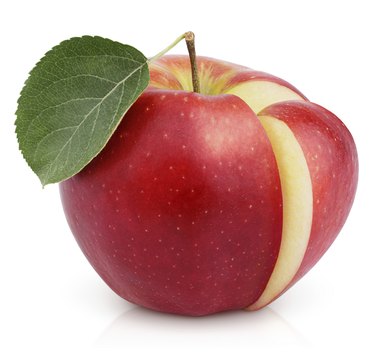
Hard apple cider is becoming more popular in the United States, reports "The Seattle Times," with sales increasing by 50 percent from 2011 to 2012. Made from a fermented mixture of yeast and freshly pressed apple juice, hard apple cider's alcohol content is comparable to that of beer -- around 4.5 percent to 6 percent alcohol by volume; however, according to "St. Louis Post-Dispatch" writer Gail Appleson, it is more similar in taste and consistency to a sparkling wine -- light, crisp, bubbly and sometimes sweet. A 12-ounce bottle of hard apple cider can contain between 140 to 200 calories. Consume it in moderation to avoid weight gain.
High in Sugar
Video of the Day
The majority of the calories in hard apple cider are supplied by carbohydrates, particularly simple sugars. One commercial brand of hard apple cider contains 29 total grams of carbohydrates in a 12-ounce bottle, meaning that carbohydrates supply nearly 60 percent of the beverage's caloric intake. Of this amount, 23 grams -- approximately 92 calories -- come from the natural sugars in apple juice. Although your body needs simple sugars like glucose to metabolize for energy, it's best to choose complex carbohydrates over liquids like hard cider, which contain less fiber and fewer essential nutrients.
Video of the Day
Rich in Antioxidants
In 2008, a study conducted by Brewing Research International found that a 250-milliliter serving of hard apple cider -- equivalent to about 8 ounces or 1/2 pint of hard cider -- can have as many active antioxidant compounds as a glass of red wine and possibly more than a serving of white wine, black or green tea, or fresh vegetables like tomatoes. The antioxidants in hard apple cider may help lower your risk of chronic medical problems like heart disease and cancer.
Low in Sodium and Other Minerals
A 12-ounce serving of hard apple cider may contain just 10 milligrams of sodium, or less than 1 percent of the 2,300-milligram daily sodium limit suggested for the average healthy American. Even if you're on a sodium-restricted diet and aim to consume no more than 1,500 milligrams per day, drinking a typical 12-ounce hard apple cider will only supply 0.6 percent of your recommended daily sodium intake. Some brands of hard cider may contain up to 40 milligrams of calcium -- approximately 4 percent of an adult's recommended daily allowance -- in a 16.9-ounce can.
Minor Source of Vitamin C
Hard apple cider is not a good source of most vitamins. Some brands do contain larger amounts of vitamin C, however. One that features 16.9-ounce cans of hard apple cider provides about 6 percent of the recommended daily allowance of the nutrient for a healthy adult following a 2,000-calorie diet, or approximately 4.5 milligrams per serving. Don't rely on low-nutrient beverages like hard apple cider to fulfill your required daily intake for essential vitamins.
- The Seattle Times: News Summary - Hard Cider Bigger in Beverage Market
- Times-Standard: Hard Cider Takes a Bigger Slice
- St. Louis Post-Dispatch: Wine Finds - Hard Ciders Are More Like Wine Than Beer
- Giant Eagle: Crispin Hard Apple Cider
- ShopWell: Angry Orchard Hard Apple Cider
- Centers for Disease Control and Prevention: Carbohydrates
- U.S. Department of Agriculture: Dietary Guidelines for Americans, 2005
- Centers for Disease Control and Prevention: Most Americans Should Consume Less Sodium
- University of Maryland Medical Center: Calcium
- Alcohol in Moderation: Antioxidants in Beer and Cider